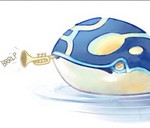|
TooMuchAbstraction posted:Are you talking about the pain-in-the-rear end climb, or the pain-in-the-rear end block-pushing bit? I mean the bit that the devs admitted they didn't playtest properly. So the whole climb and balance beams bit that causes a spike in blood pressure to anyone who played this game.
|
|
|
|

|
| # ? May 3, 2024 06:21 |
|
I like how Kratos' double jump is just him floating up a bit. There's no mid-air flip or spin, he just suddenly is higher up in the air.
|
|
|
You'll get a better look at it eventually, but he does a little kick thing. Also, congrats on this thread being pretty cool right from the first page, KZ. Guess you had nothing to worry about after all. 
|
|
|
|
|
Great Joe posted:You'll get a better look at it eventually, but he does a little kick thing. Also, congrats on this thread being pretty cool right from the first page, KZ. Guess you had nothing to worry about after all. You jinxed it. Thanks a lot, jerk.
|
|
|
Crap. Now there's all sorts of pressure going on. 
|
|
|
|
|
kalonZombie posted:You jinxed it. Thanks a lot, jerk. I suddenly feel like voting this thread a 1. How Olympianly dickish of me, right?
|
|
|
|
bman in 2288 posted:I suddenly feel like voting this thread a 1. How Olympianly dickish of me, right? Only if you sleep with its daughter and kill all its cows. Good so far kalon, except for the part where I remember I know what Hecatonchires are.
|
|
|
|
Just want to take a minute to say that my buddy Heavenator is demanding retribution for the time I made him play through All 4 One, so please watch our WatchUnderscoreDogs LP. Ape even guests in the first video!
|
|
|
|
kalonZombie posted:Just want to take a minute to say that my buddy Heavenator is demanding retribution for the time I made him play through All 4 One, so please watch our WatchUnderscoreDogs LP. Ape even guests in the first video! Oh nice, been waiting for an lp of that.
|
|
|
|
I do love God of War. I recently finished re-playing the HD version on PS3, and am also working through 2 and 3 (never played the PSP games or Ascension). The first game especially has a lot of cut content, and I would love for Sony to release a collection of the stuff they cut (call it "Lost Legends" or something). Then again, I'm sure they used the dropped ideas in the games I haven't played.
|
|
|
|
I only know of one boss fight that was cut from the game, near the very end, but it never popped up in any of the other games. At least not as the monster it was supposed to be. Maybe they used the tactics and ideas in a different monster? I dunno! I'll talk about it when I get there.
|
|
|
|
Just as I was specifically hoping for a thread that would teach me gratuitously about Greek mythology while also bathing my eyeholes in beautiful gore, here you come to answer my prayers. I always found GoW more fun to watch than to play anyways. Great start, followed!
|
|
|
|
I remember hearing some time ago that the Spartans in general weren't all that great a fighting force during the old days, they were just really totalitarian and had a good propaganda team. Was that the case?
|
|
|
|
Samovar posted:I remember hearing some time ago that the Spartans in general weren't all that great a fighting force during the old days, they were just really totalitarian and had a good propaganda team. Was that the case? The Spartans really were good fighters, mostly out of practicality. Their slaves, the helots, were so numerous and so mistreated that revolts were common. Their entire culture was based around combat, and they kept two kings at all times so that one could fight abroad while the other remained at home to coordinate their defense in case the helots rose up.
|
|
|
|
Samovar posted:I remember hearing some time ago that the Spartans in general weren't all that great a fighting force during the old days, they were just really totalitarian and had a good propaganda team. Was that the case? Sparta's totalitarianism and insane fascistic society was indeed of a much higher calibre than either their ability to sell themselves or their fighting prowess. That doesn't mean so much, because they actually scored pretty highly in all of those categories. Despite having very very few notable writers of their own - a consequence of the laser-focused military lifestyle enforced on them - they still somehow ended up with a lot of fans, whether for their discipline or asceticism or plain lack of democracy, which is a big pull for your typically aristocratic Greek chronicler. The Spartans had a long period of real (land-based, at least) military dominance in Greece too, a result of being so much more professional than any other army that could be sent against them. Unfortunately, this is something of a double-edged sword, which leads to Sparta's occasional defeats even during that dominant period and its eventual decline into almost total irrelevance. There were structural weaknesses inherent to maintaining a professional army at that point in history. The Spartans did it by devoting the entire male population of their ruling class (the Spartiates) to the army, training them harshly from boyhood and keeping them in their barracks or on campaign for most of their adult life. This means that every other activity necessary for a state to actually maintain itself, all the agriculture and industry, was left to the subject classes - the perioikoi, 'those who live around' Sparta itself; and the helots, the slave underclass. So, Issue One: Helots Reliance on this slave class particularly was a problem, because the Spartiate class was so much smaller numerically compared to its slaves than the other Greek states of the time. That meant very severe repression, to try to compensate for the disparity. Conditions were as bad for a helot, or worse, than American chattel slavery of the 18th/19th centuries, where at least some of the usual Greek slave population would have had much more humane treatment. There are lots of points during various wars where the Spartans either stay at home when they ought to have been marching out, or drop a campaign to return home, because they have to deal with helot revolts. Issue Two: Numbers This plays off the first point a little, in that the Spartiate numbers were just too small a lot of the time. This is obviously a risk from the start when you devote an entire class to war - people of that class have an unfortunately shorter life expectancy. On a tactical level, it means you can end up being so outnumbered that any amount of professionalism does you no good whatsoever. When the Athenians pull the rowers off their ships to help their dedicated land forces, as during the mini-campaign at Pylos and Sphacteria during the Peloponnesian War, the Spartans end up outnumbered 20-1 or more. On a strategic level, it decreases their military flexibility a lot - simultaneously garrisoning areas and maintaing a sizeable mobile force becomes very tricky - and it means single battles can swing a war profoundly. Returning to Pylos and Sphacteria, the defeat there resulted in the capture of about 200 Spartiate warriors. That's not a lot even by the standards of a 5th century BCE Greek city state, but their loss was such a potential blow to the Spartan overclass that the city had to sue for peace. That battle and those prisoners decided the first part of the Peloponnesian War in favour of Athens. We often actually divide the more famous "Peloponnesian War" into two - the Archidamian War, for one of the Spartan kings at the time, which was lost by Sparta after Sphacteria; and the Decelean War, for the area of Attike that Sparta occupied, and which Sparta eventually won. The numbers issue is probably the one I would link most to Sparta's long term decline. Between the exertions of the Peloponnesian War, the domestic and foreign battles fought during the brief Spartan hegemony afterward, and a couple of more-and-less lucky wins for their enemies as Spartan dominance of Greece collapsed, they just couldn't sustain an army that could do anything significant. Too many Spartiates died, and there wasn't a good way to compensate for it, as much as they tried. They were a spent force by the time Philip and Alexander come around, nice one liners notwithstanding. Issue Three: Doctrine This has links back to point 1 and 2, almost like societies are complex and interconnected things that resist neat categorisation. Anyway, I wanted to highlight this because it lets me elaborate a bit on how Greeks went to war and what the Spartans did the same and did differently. Greek armies were not professional. You called up everyone you could who had armour, weapons, or a horse - some states wrote it in as class obligation, or put people on temporary war pay or something, but very few people just spent any peace time being a soldier, in the way modern armies do. This means you have a core of rich toffs with decent equipment - the cavalry and heavy hoplite infantry - and then kind of a rabble of skirmishers and lightly armoured troops who are likely as not just there for the loot. Spartans earned their reputation because the Spartiates, as professionals, were way better fighters than the hoplite core and should then be able to shrug off the poorer and less well equipped auxiliaries. Easy victory. It's a little more complex than that because the Spartiates often brought along auxiliaries - hoplites from their allies or the perioikoi, and helot slaves to be the accompanying light force - but that's broadly how it was meant to play out. If we look at the 300 Spartiates at Thermopylai, they were reinforced by allied/perioikoi hoplites in much greater numbers than them, but the Spartiates were lionised for staying so long and doing the bulk of the killing because they were the most professional part of the force. This all leads up to the eventual point: some generals were too smart to play by the old rules, given that it looked like a losing proposition against the Spartans. For a long time, typical hoplite battle just wasn't going to get you a victory. So, instead, perhaps you concentrated on your light forces. The lightness, the mobility and the ranged advantage (plus the numbers, certainly) of the Athenian skirmishers and javelineers were key to Demosthenes winning the Athenian victory at Sphacteria. Hoplite armour was good, but when your enemies slip in and out and you're too weighted down to ever catch them, it will fail eventually. Athens likewise could dominate long stages of the Peloponnesian War just by refusing to engage on land. During the build-up to and the early stages of the Peloponnesian War, Athens built fortifications around itself and extended the famous Long Walls out to the harbour at Piraios. Then they just sat inside it all and the Spartans basically couldn't do anything. Siege weaponry was inadequate, and the Athens was kept (mostly) well supplied by sea and their island empire. Athens even could launch raids by ship on the Spartan home territories in retaliation while the Spartiate army (too small, you remember, to do proper garrisoning) fruitlessly wandered around Attike being ineffectual. By moving the fight to the sea, where Athens was much more adept and professional, they turned the usual equation back on the Spartans.
|
|
|
|
A few notes from what I remember of the (excellent) Cartoon History of the Universe books: * Hoplites were basically heavy infantry. They had a pretty full set of armor considering they were fighting in the Mediterranean heat, as well as tall shields and spears. All this armor meant that they had pretty poor mobility though, so I'm not surprised they had trouble with skirmishers. * Athens didn't get out of the Peloponnesian War scotch-free. It wasn't in danger of starvation during the Siege of Athens, but bringing all those people together, especially with contemporary approaches to hygeine, meant that plague was a serious problem. The author of the Cartoon History series speculates that the comedies of Aristophanes (which are pretty damned funny even today) were in part a reaction to/relief from the horrors of the war.
|
|
|
|
Just beat Ascension, (garbage) and was going to play this one again, but I'll just watch you instead. I also am reading up on Ancient Greece, (took a couple courses on the subject, but my memory is fuzzy) and have quite a few books on the myths as well. I have Robert Graves "Greek Myths", but one of my professors said the book is "next to worthless" but I haven't found anything to collaborate that. Anyone know? EDIT: On the subject of Sparta, a lot of their culture and history written down is not accurate. Even Plutarch and others mentioned that later Greek society idolized Sparta, and gave them desirable attributes they felt were needed for the modern world. rocket_man38 fucked around with this message at 01:58 on Aug 29, 2014 |
|
|
|
Graves' scholarship swings wildly between 'good' and 'not good'. The not good is for about fifty different reasons: being blinded by comparisons to contemporary situations, being too focused on some idea he's latched on to, deliberately disregarding fiddly nuances ... I can't speak to that exact book, but a general warning is definitely worth keeping in mind.
|
|
|
|
What's the word on Edith Hamilton's "Mythology"? I think it's pretty interesting, even if she does kinda glaze over a lot more of the various stories. EDIT: VVV Yeesh, that price though... kalonZombie fucked around with this message at 02:48 on Aug 29, 2014 |
|
|
|
kalonZombie posted:What's the word on Edith Hamilton's "Mythology"? I think it's pretty interesting, even if she does kinda glaze over a lot more of the various stories. Seems pretty legit. I'd pick up Bulfinch's Mythology as well, but it isn't as easy to read as that, sounds like. If you're up for a challenge, you can read Apollodorus's "Library of Greek Mythology", but it is a primary source, and pretty confusing. I use this book, from one of my courses http://www.amazon.com/Classical-Mythology-Insights-Stephen-Harris/dp/0073407526 and it helps a lot, mainly framing the myths in a historical context.
|
|
|
|
Sleep of Bronze posted:*snip* Excellent summary of the Spartans' problems in the Classical period. If I may, shortly, expand on the decline of Sparta, I'll just add that the Spartans' social classes were, indeed, separated by wealth in addition to birth. The Spartan Army became unsustainable not only because of battlefield losses but also because they kept losing family lines (and thus sources of soldiers) to poverty, denying them citizenship and service as Hoplites as per the laws of Sparta. It's a gross oversimplification, but I have a friend who's about to write his Masters thesis on Nabis and his attempts to reform Sparta to make it relevant again in the 2nd Century BC. His reforms included augmenting the recruitment pool of the Spartan Army by doing away with the old restrictions. kalonZombie posted:What's the word on Edith Hamilton's "Mythology"? I think it's pretty interesting, even if she does kinda glaze over a lot more of the various stories. Most good books on the subject are costly because they're fairly limited edition runs. Hell, most good books on ANY subject regarding Antiquity are costly because they're printed in small numbers. Outside of Amazon, you'll only find them in Universities or specialized libraries.
|
|
|
|
rocket_man38 posted:EDIT: On the subject of Sparta, a lot of their culture and history written down is not accurate. Even Plutarch and others mentioned that later Greek society idolized Sparta, and gave them desirable attributes they felt were needed for the modern world. But since he knows this and (obviously) compensates for it, we're surely on solid ground taking his stuff at face value, right? Really, the most major primary source on Sparta is Xenophon, and he's right there at the peak of Spartan dominance; detail being lost to time, or a desire to make them more contemporaneous, is not the big problem. Xenophon being starstruck there and now is. Delta Green posted:Excellent summary of the Spartans' problems in the Classical period. If I may, shortly, expand on the decline of Sparta, I'll just add that the Spartans' social classes were, indeed, separated by wealth in addition to birth. The Spartan Army became unsustainable not only because of battlefield losses but also because they kept losing family lines (and thus sources of soldiers) to poverty, denying them citizenship and service as Hoplites as per the laws of Sparta. kalonZombie posted:What's the word on Edith Hamilton's "Mythology"? I think it's pretty interesting, even if she does kinda glaze over a lot more of the various stories. My typical recommendation for people interested in classical myth isn't to try and take it all in. There's too much, you have to resort to summaries and synopses, and all the nuance and varied takes and little links get lost. Pick a single person or event or monster you're interested in, and follow that thread. Plays are almost always the best starting point for a big narrative, then you can see if there are other different and interesting ideas about it in Plutarch or Strabo or Pausanias or Apollodoros. If someone feels they need background going in, then I can only tell them that means they have a bit work to do. A basic foundation probably means going through the old poets like Greek children would have at school. Read the Iliad, the Odyssey, and Hesiod's Theogony and his Works and Days - then you have solid footing. (To be fair, while these poems are comparatively enormous at thousands upon thousands of lines, even the Homeric epics don't make overly large paperbacks when printed in the modern world, and Hesiod's canon isn't a tenth that size.) Sleep of Bronze fucked around with this message at 03:23 on Aug 29, 2014 |
|
|
|
but also after you've read the iliad and odyssey read the aeneid because its the best.
|
|
|
|
lovely Vergil fanfiction, did you say? Yes, I definitely agree. 
|
|
|
|
Sleep of Bronze posted:lovely Vergil fanfiction, did you say? Yes, I definitely agree. Pretty much. It was a trend that continued. Geoffrey of Monmouth's "History of the Kings" tied British kings to Roman emperors, imitating the same idea.
|
|
|
|
Have to say, I loved the hell out of the mythology interlude. Looking forward to those! And also more inexplicable balance beams, because that seems like a gimmick that isn't enough for one level.
|
|
|
|
I remember one of my courses on Roman history saying a lot of the Spartan Mirage, so to speak, also comes from Romans identifying with many of the values ascribed to the Spartans. Is that correct or out of your wheelhouse? It's really great to have a classicist in the thread.
|
|
|
|
Man I miss these games. I played 1 and 3 in college and then I was borrowing my girlfriend's brother PS3 for a year and bought the 1&2 combo pack (with the sweet red Dualshock 3) and replayed those two. I sadly no longer have that PS3 and am trying to convince myself that it'd be worth buying one for the KH re-releases, maybe if I add replaying these to the equation?
|
|
|
|
Night10194 posted:I remember one of my courses on Roman history saying a lot of the Spartan Mirage, so to speak, also comes from Romans identifying with many of the values ascribed to the Spartans. Is that correct or out of your wheelhouse? It's really great to have a classicist in the thread. Ehh ... I don't know? Like, there are Greek historians in the Roman period who have some admiration for the Spartans, but the actual native Roman historians that come to mind (Livy, Sallust, Tacitus, Appian, Quintus Rufus) don't have anything especially to say about them, as far as I remember. Sallust is an odd sort of case in that he's an old-school hawkish hardarse who would seem to have at least a bit of respect for the Spartan way even if he didn't admire them in every particular, but he barely mentions them. Still, that's an impression based off my (in some cases, a bit shaky) memories of a few of the big names. I absolutely wouldn't count out the possibility of that being a thing in Rome, but I can't give you any positive evidence.
|
|
|
|
Sleep of Bronze posted:Ehh ... I don't know? Like, there are Greek historians in the Roman period who have some admiration for the Spartans, but the actual native Roman historians that come to mind (Livy, Sallust, Tacitus, Appian, Quintus Rufus) don't have anything especially to say about them, as far as I remember. Sallust is an odd sort of case in that he's an old-school hawkish hardarse who would seem to have at least a bit of respect for the Spartan way even if he didn't admire them in every particular, but he barely mentions them. We do get some mention in Livy or Polybius, I think, of Romans bemoaning the fall of Sparta after the Second Macedonian war and certainly of Sparta becoming a sort of folksy old time village for rich Romans to visit during the Principate (though I recall not where… Strabo, perhaps?). The Romans respected the military prowess of the Spartans, to be sure, but otherwise their disdain for monarchs shone true. As for the myths, you can always go back to the origin of Classical Studies…. our good friend Theodor Mommsen, who basically assembled and codified everything there is to read from Antiquity, or at least Rome.
|
|
|
|
My highschool library had a copy of Bulfinch's Mythology and it was the best i could do to skim through it since it's a very difficult read. It's a good source but it's not the easiest to pick up and read.
|
|
|
|
Hmm, I'll have to read up on Xenophon. I just have Plutarch's "On Sparta" handy. I always wondered how accurate Plutarch's account of Lycurgus's life is. He can't be exaggerating moreso than say, Herodotus, but still. Suetonius is to be taken with a grain of salt though. My prof described as basically writing the "National Enquirer" of the day.Smornstein posted:My highschool library had a copy of Bulfinch's Mythology and it was the best i could do to skim through it since it's a very difficult read. It's a good source but it's not the easiest to pick up and read. Ya, it's not for beginners. Ultimately, you really need to have some historical context/ explanation to accompany a lot of the myths. I tried tackling Apollodorus before really understanding much about it, and it didn't turn out well. rocket_man38 fucked around with this message at 06:17 on Aug 29, 2014 |
|
|
|
rocket_man38 posted:Hmm, I'll have to read up on Xenophon. I just have Plutarch's "On Sparta" handy. I always wondered how accurate Plutarch's account of Lycurgus's life is. He can't be exaggerating moreso than say, Herodotus, but still. Suetonius is to be taken with a grain of salt though. My prof described as basically writing the "National Enquirer" of the day. Plutarch is a moralist. He's making a point and doesn't really care about truth beyond the broadest strokes. Not to say you can't find interesting or even factual things in his writings, but you have to keep in mind that he's writing a moral tale rather than a historical record. He is still immensely well read and that allows him to craft very accurate stories, even if he manipulates the details to fit his moral point of view. Suetonius is much the same, but somewhat less well read than Plutarch. Still a magnificent scholar of his day, but slightly less sources that support his works. Herodotus, at least, tries for the impartial, even if, as he acknowledges himself, he fails to achieve it. Every time he talks of something he didn't see himself, he tells us and even names his source most of the time. When it's rumour, he says it outright. When there no other source of information, he says it. He might exaggerate, but I wager it was more his sources exaggerating and Herodotus faithfully reporting it as stated. Xenophon is the closest you'll ever find to a true Historian in Antiquity. He's almost perfectly impartial in his reporting of events, he expresses great interest in economic and social matters as well as the traditional politico-military narrative favoured by almost all other Historians until our time and he's very precise in his search for sources. He starts off where Herodotus ended and follows through to the end of the Peloponnesian War. Being a disciple of Socrates as well as a mercenary commander, he offers extremely interesting perspectives into the events surrounding him. For additional reading, I'd suggest a comparative reading of Plato's Apology of Socrates and Xenophon's Apology of Socrates. It underlines the beliefs of the man, as well as his perspective on Socrates. Delta Green fucked around with this message at 06:47 on Aug 29, 2014 |
|
|
rocket_man38 posted:Pretty much. It was a trend that continued. Geoffrey of Monmouth's "History of the Kings" tied British kings to Roman emperors, imitating the same idea.
|
|
|
|
|
Delta Green posted:Herodotus, at least, tries for the impartial, even if, as he acknowledges himself, he fails to achieve it. Every time he talks of something he didn't see himself, he tells us and even names his source most of the time. When it's rumour, he says it outright. When there no other source of information, he says it. He might exaggerate, but I wager it was more his sources exaggerating and Herodotus faithfully reporting it as stated. We're thinking of the same Herodatus right? The one who wrote about the giant horse sized ants that lived in the lands to the east?
|
|
|
|
Now, I apologise if I am asking very... uh, vague question about ancient Greece, but it is my understanding that Greece in those days was never a unified country, just city states. Their high-point was with Alexander of Macedonia... but they eventually got conquered by the Romans. Is that right, or am I totally mistaken?
|
|
|
|
Spot on.
|
|
|
|
Delta Green posted:Plutarch is a moralist. He's making a point and doesn't really care about truth beyond the broadest strokes. Not to say you can't find interesting or even factual things in his writings, but you have to keep in mind that he's writing a moral tale rather than a historical record. He is still immensely well read and that allows him to craft very accurate stories, even if he manipulates the details to fit his moral point of view. quote:"Why is it that the Samians, when they sacrifice to Hermes the Joy-giver, encourage whoever wishes to rob them and steal their clothes?" quote:Xenophon is the closest you'll ever find to a true Historian in Antiquity. He's almost perfectly impartial in his reporting of events, he expresses great interest in economic and social matters as well as the traditional politico-military narrative favoured by almost all other Historians until our time and he's very precise in his search for sources. He starts off where Herodotus ended and follows through to the end of the Peloponnesian War. Being a disciple of Socrates as well as a mercenary commander, he offers extremely interesting perspectives into the events surrounding him. WanderingMinstrel I posted:We're thinking of the same Herodatus right? The one who wrote about the giant horse sized ants that lived in the lands to the east? In general, despite Herodotos having a bad rep, I'm ~90% in with Delta on this. He reports a lot of wacky stories, but it's reporting. He wants to faithfully set down the results of his inquiry, not set out a record of only the things he believes are fact. Which is a view that historians today would call responsible, and is especially nice because on the occasions that he does tell the reader he believes a certain side to a set of stories he's recorded, he is quite often wrong. We only have the more true versions because he didn't have the ego to push only his thoughts on us and laid everything else. It's a very acceptable price to pay for reading some (cool and hilarious) stories told by locals to the gullible foreigner about flying snakes. Samovar posted:Now, I apologise if I am asking very... uh, vague question about ancient Greece, but it is my understanding that Greece in those days was never a unified country, just city states. Their high-point was with Alexander of Macedonia... but they eventually got conquered by the Romans. Is that right, or am I totally mistaken?
|
|
|
|
I would like to respectfully point out that marmots are not even remotely ant-like. I understand why people like him as a historian, its just always jarring to be happily reading along and all the sudden some batshit crazy thing jumps out of the page at you. Did Xenophon write much other than the Anabasis as far as major works? That book was batshit crazy in a completely different way, as in there were no giant ants, but its what made me realize that the modern mindset is almost incompatible with what would be normal and fine in the BC's. "Oh, you say that village you just passed refused to sell you all the food they needed to live through the winter so you killed some and took the rest as slaves? That seems completely reasonable! Sure we'll send a guide with you. Oh wait, that one's my nephew, think you could free him real quick since you're all here?" That whole section blew my mind. Everyone's just so blase about it.
|
|
|
|

|
| # ? May 3, 2024 06:21 |
|
WanderingMinstrel I posted:I would like to respectfully point out that marmots are not even remotely ant-like.  quote:Did Xenophon write much other than the Anabasis as far as major works?  , the Economics, another Socratic Apology, a hunting manual ... he was pretty prolific. , the Economics, another Socratic Apology, a hunting manual ... he was pretty prolific.
|
|
|






























